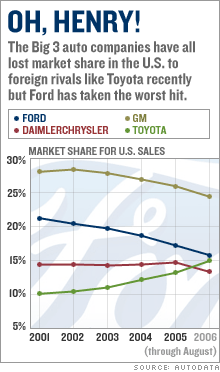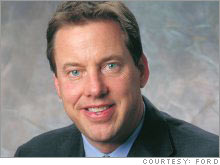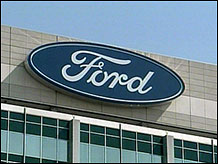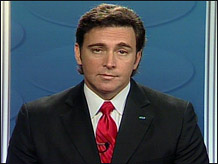Another day of pain at FordNo. 2 automaker to hasten and expand plant closings, trim a third of white-collar jobs and suspend dividend; still, stock tumbles as expected rebound to profitability delayed.NEW YORK (CNNMoney.com) -- Ford Motor Co. unveiled new plant close closing and staff cut plans Friday, admitting it can no longer hang onto its position as the nation's No. 2 car company or return its core auto unit to profitability as soon as previously promised. The company said the new cuts, along with a suspension of its dividend, will allow it to save $5 billion in costs in the coming years, as it tries to adjust to its more modest place in the U.S. market.

But the company also admitted that it will not be able to restore its troubled North American auto unit to profitability before 2009, as opposed to the 2008 target date previously given. And it had to drop its earlier promise to reduce material purchase costs by $6 billion, saying the fragility of its supplier base and rising raw materials costs made such savings unachievable. Shares of Ford (Charts) plunged more than 13 percent in late morning trading Friday on the announcement. Merrill Lynch analyst John Murphy downgraded the stock to a "sell" recommendation from his previous neutral rating, saying the company's plans provided less savings than had been hoped by the markets. Still, the moves announced Friday will mean at least two more plant closings in the next two years and a cut of another 10,000 white-collar jobs above what had already been announced, as Ford trims one salaried worker out of every three. In addition, all 75,000 U.S. hourly workers will be offered cash incentives as high as $140,000 if they give up some promised benefits and leave the company. Ford also said that it now is shooting for a much smaller share of U.S. auto sales, about 14 to 15 percent going forward, starting in 2007. The new target would likely put it permanently behind Toyota Motor (Charts) for the No. 2 market share position. Toyota, with a long record of increasing U.S. sales, has 15 percent of U.S. market in the first eight months of this year, while Ford's sales represent 16.8 percent during that period. This July was the first month in its history that Ford's U.S. sales trailed Toyota. Chairman Bill Ford, whose great-grandfather Henry Ford founded both the company and the modern auto industry more than a century ago, said he's not concerned with Ford's loss of the No. 2 position in the market. "Frankly our ranking doesn't matter," he said in a response to a reporter's question Friday. "You've seen companies chase market share with sometimes disastrous results. It's more important for this plan to be based on conservative assumptions." The company has plans to close or sell nine plants by 2008, and it is looking for another seven plants by 2012. The additional plants to be closed have not been identified. The nine plant closings now set by the end of 2008 will give the company capacity to build 3.6 million vehicles annually in North America. That's down 26 percent from its capacity in 2005. But executives conceded that won't be enough as Ford tries to have North American plants operating at 100 percent capacity. The lower 15 percent market share target requires the additional closings in order for Ford to have its assembly lines fully utilized. The company did not announce plans to sell any units, such as Ford Credit, or dump any brands like Jaguar. Some observers had been calling for such moves. Deeper cuts
The company did not give any new staffing targets for its union-represented workforce with the buyout offers and additional plant-closing plans. But it said the moves announced Friday will speed up the pace of its previously announced cuts of 30,000 hourly jobs, which it previously hoped to do by 2012. It said it had to do so to respond to the drop in demand for its light trucks, such as pickups and SUVs, in the face of high gasoline prices. "The fundamentals of our 'Way Forward' plan have not change[d]," said Mark Fields, Ford's president of the Americas and the architect of the turnaround plan. "It's our time table that has changed, and changed dramatically." Ford said it would trim about 14,000 salaried workers, or about a third of its management team, up from its earlier target of 4,000 white-collar job cuts. It also added two plants - the Maumee, Ohio, stamping plant and the Essex, Ontario, engine plant - to its target of 14 plant closings that had already been planned. "These actions have painful consequences for communities and many of our loyal employees," said a statement from Bill Ford. "But rapid shifts in consumer demand that affect our product mix and continued high prices for commodities mean we must continue working quickly and decisively to fix our business." The company also said it would suspend its dividend in the fourth quarter. That move will save the company about $350 million a year, according to a company. Company executives tried to emphasize that the announcement Friday was not all about cuts. The company also said it intends to speed up its plans to introduce new vehicles, aiming to have about 70 percent of its sales be new or significantly upgraded models by the end of 2008. It will make a new push in so-called crossover vehicles, which offer some of the capabilities of an SUV in a more carlike vehicle. It also said it will have a all-new F-150 pickup, the nation's best-selling vehicle, on sale that year. Weak sales of pickups this year in the face of higher gasoline prices have forced the company to slash fourth-quarter production plans by 21 percent, its deepest cut since 1982. "This remains a product led turnaround, first and foremost," said Fields. He said the company's decision to push back its target for profits is attributable partly to its commitment to develop new vehicles. "It would have been easy for us to cut our product plan to hit the 2008 number, but we're not going to do that," he said. The company said that some of the drop in market share will result from a move away from fleet sales, particularly to the rental car industry. It had already announced it would halt production of the Taurus, which is sold basically only to rental car companies. Friday it said it will discontinue the minivan as it offers crossover replacements for that traditional model. Wall Street analysts had been critical of Ford for taking so much time to make the cuts in the face of worse than expected losses and weak sales. The company's auto operations lost $3.9 billion before taxes in the first half of this year, up from a $98 million loss in the same period of 2005. And its U.S. vehicle sales for the first eight months of the year are off 10 percent, even as its car models saw a 6.3 percent increase in sales in the period. Its sales of light trucks, including pickups and SUVs, were down nearly 18 percent in the period, and light trucks is the segment that it depends on for most of its sales and opportunities for profitability. Ford's offers to unionized workers match the move made by competitor General Motors (Charts) to its hourly staff earlier this year, a move that is credited with helping the No. 1 automaker trim costs much faster than Wall Street had been expecting. GM, Ford and the Chrysler Group unit of DaimlerChrysler (Charts) have had problems competing with import brands such as Toyota Motor, Honda Motor (Charts) and Nissan, which do not have the large health care costs and retiree benefit expenses. Ford last week named an outsider, Boeing (Charts) executive Alan Mulally, as the new CEO to lead the turnaround effort. __________________________________ |
Sponsors
|




